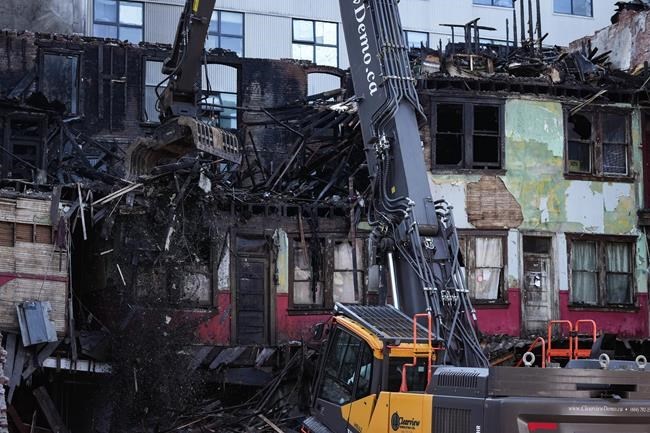
The jury in a coroner's inquest into the Winters Hotel fire in Vancouver two years ago has been stood down to deliberate its recommendations about the deadly blaze. Debris falls to the ground as demolition resumes on the Winters Hotel after a body was found in the single room occupancy (SRO) building, in Vancouver, B.C., Friday, April 22, 2022. THE CANADIAN PRESS/Darryl Dyck
Republished February 02, 2024 - 5:06 PM
Original Publication Date February 02, 2024 - 11:11 AM
VANCOUVER - A coroner's inquest jury looking into the Winters Hotel fire that killed two people in Vancouver two years ago was stood down Friday to deliberate potential recommendations to avoid similar deaths.
For two weeks, the inquest heard evidence about the fire that killed residents Mary Ann Garlow and Dennis Guay, including testimony that the sprinkler system wasn't operating because of a smaller fire three days earlier.
Presiding coroner John Knox told jurors they could only make recommendations based on evidence presented at the inquest, and not "blame or vindicate any person or agency."
Knox told the jury they weren't allowed to make "findings of legal responsibility" or make any legal conclusions about the fire that destroyed the Gastown rooming hotel on April 11, 2022.
He told the jury to make two verdicts, one for each death, and make recommendations to prevent similar deaths in the future.
Knox recounted evidence given by police and firefighters about how Garlow and Guay both died as a result of an "unintended accident," rather than homicide, suicide or natural causes.
The Winters Hotel was one of approximately 150 single-room-occupancy buildings housing some of Vancouver's most vulnerable residents, who the jury heard are often on the verge of homelessness.
Jurors were told that a few recommendations targeting "broader failures of systems and standards" would be more effective than numerous recommendations addressing "unique circumstances."
The bodies of Garlow, 63, and Guay, 53, were found during demolition of the hotel more than a week after the fire.
The jury saw video from inside the hotel during the fire, showing smoke filling the hallways and pieces of burning wood falling from above as tenants alerted each other to the danger.
The inquest heard that the old building did not have the kind of modern "compartmentalization" that would have slowed the spread of flames and smoke between rooms.
The design meant the fire spread rapidly. The sprinkler system had been shut off three days before the fatal blaze after a smaller fire led to flooding in the building. Multiple fire extinguishers were also left empty, the jury heard.
The Vancouver fire department ordered the building's sprinkler system and fire alarm to be serviced after the first fire, which took place on a Friday. But the building's manager, Gina Vanemberg with Atira Property Management, testified that she didn't call the fire safety company to have the system reset until after the weekend.
Vanemberg told the jury she didn't believe the company would come over the weekend and there was an understanding that workers were not to be called in on the weekend to avoid overtime costs.
Chauncey Carr, who oversaw several buildings for Atira, testified later that he told Vanemberg to call the fire safety company after the Friday fire. He said emergency situations like resetting sprinklers would be approved for overtime.
The company was scheduled to re-set the system at 3 p.m. on Monday but the second fire broke out hours before they were due to arrive.
Officials with Atira initially reported that all tenants were accounted for, but 11 days later the remains of Garlow and Guay were discovered in the rubble.
Some witnesses testified that some of the building's doors were locked shut with chains, but video entered into evidence didn't appear to show chains on the day of the fire.
Carr testified he did see chains on the doors months before the fire, but he said they were removed.
Guay was severely hearing impaired and used hearing aids.
Vanemberg testified that she tried to get Guay things like a flashing light or a vibrating bed to accommodate his hearing impairment in the event of a fire alarm, but she said she did not hear back from officials with BC Housing.
The jury told Knox late Friday that they needed more time to deliberate and he agreed to reconvene on Monday morning.
This report by The Canadian Press was first published Feb. 2, 2024.
News from © The Canadian Press, 2024